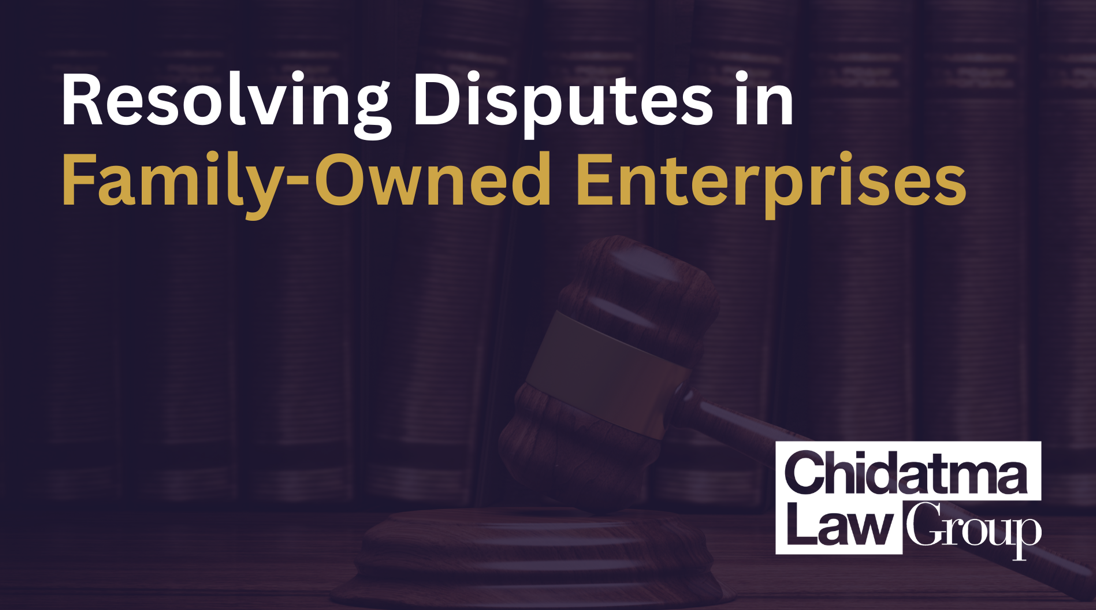
Family businesses are a cornerstone of New York’s economy. They carry tradition, loyalty, and shared purpose, but they can also carry tension. When family and business collide, disagreements can quickly escalate into disputes that threaten both the company and personal relationships.
At Chidatma Law Group, we’ve worked with family-owned enterprises across New York, helping them find solutions that balance business realities with family dynamics. Whether the issue involves contracts, ownership stakes, or succession planning, addressing disputes early and strategically can make all the difference.
Why Disputes Arise in Family Businesses
Conflicts in family enterprises often look different from those in other companies because personal history is intertwined with business operations. Common flashpoints include:
- Decision-making power: Disagreements over who has the authority to make strategic or financial calls.
- Compensation: Unequal pay among family members, or disputes about reinvestment versus distributions.
- Succession planning: Uncertainty or disagreement about who will take over leadership roles.
- Ownership interests: Conflicts over shares, buyouts, or whether non-active family members should benefit.
- External partners: Tension when family owners disagree about bringing in outside investors or leadership.
These disputes can quickly escalate, affecting not only the health of the business but also family relationships that extend far beyond the office.
Preventing Conflict with Strong Agreements
The best way to resolve disputes is to prevent them before they begin. A family enterprise should treat agreements as safeguards, not afterthoughts. Some critical tools include:
- Shareholder or operating agreements: Spell out voting rights, responsibilities, and profit distribution.
- Buy-sell agreements: Clarify what happens if a family member wants to exit or sell their stake.
- Employment contracts: Define roles, compensation, and expectations, even for family employees.
- Succession plans: Set a clear roadmap for leadership transition, reducing uncertainty.
Many families avoid conflict by putting strong legal agreements in place early, making expectations clear from the start.
Approaches to Resolving Disputes
Even with the best planning, conflicts still happen. When they do, businesses have several options for resolution:
- Informal Discussions
Sometimes, sitting down together with clear agendas and outside facilitation can get conversations back on track. Establishing ground rules for communication is often the first step. - Mediation
A neutral mediator helps guide discussions and propose solutions without imposing a binding decision. This approach often preserves relationships while finding common ground. - Arbitration
More structured than mediation, arbitration results in a binding decision by a neutral party. Many family business agreements include arbitration clauses to avoid drawn-out litigation. - Litigation
As a last resort, disputes may head to court. While sometimes necessary, litigation can be expensive, time-consuming, and emotionally taxing for families. That’s why most enterprises seek other avenues first.
When Emotions Complicate Business
One of the hardest parts of family business disputes is separating personal relationships from professional roles. For example, a disagreement over compensation may be less about money and more about perceived recognition. Similarly, conflicts about leadership transitions may reflect long-standing family dynamics.
Working with a business attorney who understands both the legal framework and the sensitivity of family relationships can help refocus discussions on practical solutions. Sometimes having a trusted advisor outside the family circle makes it easier for everyone to move forward.
The Role of Succession Planning
Succession is often the most contentious issue in family enterprises. Assumptions (such as “the eldest child will take over”) don’t always align with interest or capability. A thoughtful plan should:
- Identify future leaders early.
- Provide training or phased involvement for successors.
- Outline ownership transfers in writing.
- Allow for flexibility if circumstances change.
When handled openly and with legal guidance, succession becomes a roadmap for growth rather than a source of conflict. Our attorneys often work with families to design transition plans that respect both the business and the people behind it.
Why Legal Support Matters
Family-owned enterprises carry unique strengths but also unique risks. Without clear structures, even small disagreements can spiral. Having legal guidance means:
- Agreements are drafted to prevent misunderstandings.
- Disputes are managed with the right mix of negotiation and strategy.
- Transitions and buyouts happen smoothly and fairly.
- Families preserve not just their business, but their relationships.
At Chidatma Law Group, we’ve seen firsthand how proactive planning saves families both stress and expense. We help businesses put the right documents in place, revisit agreements as companies grow, and step in quickly when disputes arise.
Building Stability for the Next Generation
Family businesses thrive when they balance tradition with clear-eyed planning. Disputes don’t have to spell disaster—when handled thoughtfully, they can even strengthen the enterprise by forcing clarity and communication.
If your family business is navigating conflict or looking to prevent it, Chidatma Law Group is here to help. Contact us to start the conversation and build a stronger foundation for your business and your family’s future.
FAQs: Family Business Disputes in New York
- What is the most common cause of disputes in family businesses?
Conflicts often arise over decision-making, compensation, or succession planning. Because personal relationships overlap with business roles, even small disagreements can quickly escalate. - Can family business disputes be resolved without going to court?
Yes. Many disputes are resolved through informal discussions, mediation, or arbitration. Litigation is usually a last resort, as it can be costly and strain family relationships. - What documents help prevent family business disputes?
Key documents include shareholder or operating agreements, buy-sell agreements, employment contracts, and clear succession plans. These set expectations and provide a roadmap for handling disagreements. - How does mediation differ from arbitration in resolving disputes?
Mediation involves a neutral facilitator helping both sides reach a compromise, while arbitration results in a binding decision made by a third party. Both are less formal than litigation. - What role does a business attorney play in family enterprise disputes?
An attorney can review agreements, guide negotiations, represent the business in court if needed, and help create clearer structures to prevent future conflicts. - How can succession planning reduce disputes?
By setting out who will take over, how ownership transfers will work, and what support is needed, succession planning removes uncertainty and minimizes conflict among family members.

